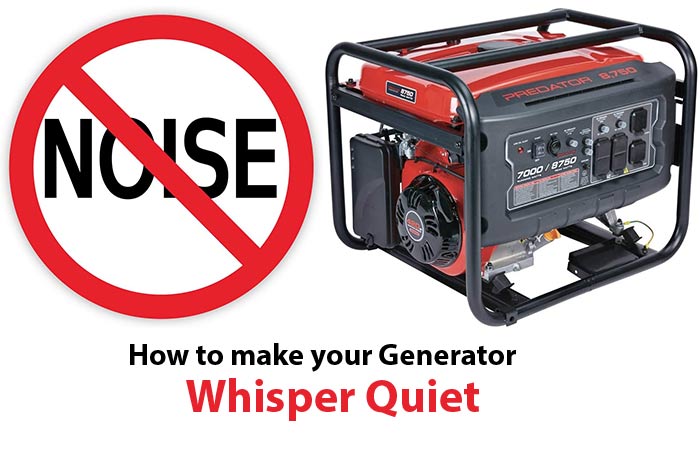The primary purpose of camping is to get away from the busy urban life and soak yourself in the harmony of nature. Away from the noise of engines and hooting cars and other daily noises. This tranquility will be spoilt if your generator keeps interrupting it with its roar.
The running of your generator can easily scare away wildlife and even irritate you and other campers if not taken care of. while you can get very silent generators from the market, it’ll be a major cost replacing your generator with another one. In such a case, finding ways to silence your generator is the best solution.
To make the portable generator for your camping RV whisper quiet, you can use a silencer, shelter box or sound deflectors, fix the muffler, reduce the vibrations, place it away, sound proof or simply buy a super silent generator
Following are details on how to reduce the noise level of your portable generator. This way, you can enjoy power from your generator without tampering with your connection to nature. In fact, you can make your generator as quiet as a cricket while at it!
How to Silence/Quiet a Generator
If your generator makes too much noise and you need it to quiet down, you can employ the following methods:
1. Add a generator silencer
Generator silencers work in the same way car silencers work. As their name denotes, they silence the generator from the engine by reducing the noise from the combustion chamber. When buying a silencer for your generator, check to find out the amount of noise it diffuses when fitted. This is because they are categorized in 3 levels depending on the amount of noise produced.
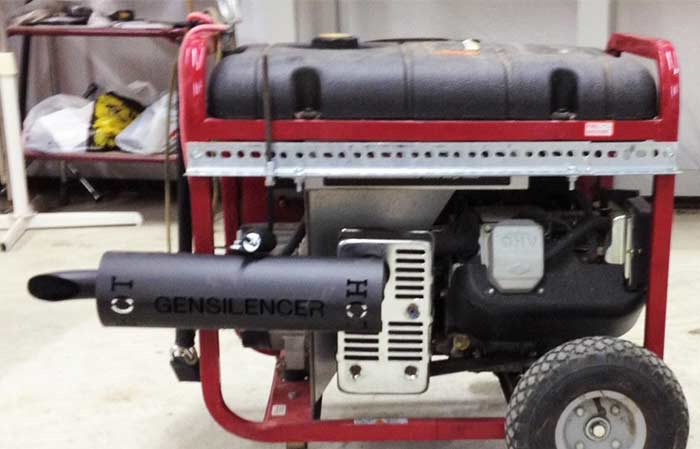
2. The water bucket method
One easy way to keep down the noise level of the generator is to use a combination of a water bucket and hose pipe. Follow the steps below:
- Connect one end of the hose pipe to the exhaust end of the generator.
- Put the other end of the hose pipe into a bucket of water (about 5 gallons of it).
- Make a small hole (about half the size of your small finger) at the high point of the pipe to prevent water from being sucked into the generator.
- Turn on the generator.
The water dampens the noise from the generator making it very quiet.
3. Reduce the generator vibrations
As you will learn shortly below, one of the causes of noise from a generator are the vibrations from its running. You can deal with it in the following ways:
- Using rubber feet and wheels. These will absorb and reduce the vibrations from the generator making it quieter.
- Put it on a rubber mat or an anti-vibration pad to absorb the vibrations.
- A soundproof mat can also do the job of absorbing the vibrations and thus making the generator more silent.
If you have any other way of stabilizing the generator, use it as it also reduces the noise levels.
4. Fix the muffler
The muffler keeps the generator silent by diffusing some of the noise from the combustion chamber. At times, it gets damaged, punctured or loose and requires refitting or replacement as per the extent of the damage.
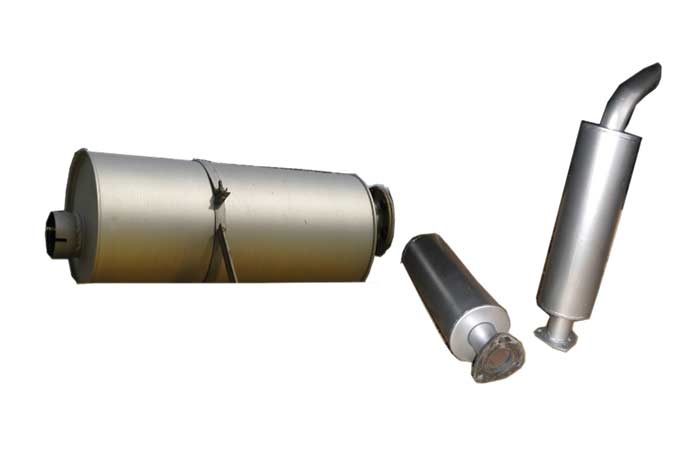
5. Place the exhaust pipes vertically
The exhaust pipe is the main outlet of the generator’s noise and exhaust fumes. When you point it to the side, you’ll be simply spreading the noise (and fumes) around. This has the result of making the generator sound noisier than it actually is.
The solution to this lies in pointing the exhaust pipes upwards where the noise spreads out into the air rather than sideways. Large vehicles with heavy engines (trucks, tractors) use this method to reduce their roar.
Given the short nature of generator exhaust pipes, you can attach a small pipe to the exhaust pipe of the generator. This pipe should then bend upwards to reduce the noise level of the generator. You can also simply twist the exhaust pipe to the upward position.
6. Shelter box or soundproof cage around the generator
While constructing a shelter box around the generator is impractical in the wild (when camping), you can use it when at home. The practical option is the soundproof cage which can be carried along with the generator. The cage will muffle the sound of the generator making it easy to control the noise.
7. Place the generator away from your place of use
One other easy method to employ is simply placing the generator away from where you’ll be. Keep it at a distance of about 7 meters (20 feet) and most generators will not even be audible. While this might still scare wildlife away, it’ll afford you some peace.
8. Soundproof your camping tent
Like placing the generator away from yourself, containing its sound within a given area is another easy solution. Simply make sure that the generator is placed in a containment with enough aeration but not too many holes as to let out all of its sound.
9. Use sound deflectors
Like a silencer, a sound reflector will reduce the amount of noise you hear from the generator. Unlike a silencer, a deflector only diverts the sound from one area to the other and doesn’t do much in reducing the overall sound. It’s a good tool to you if you don’t want the sound of the generator in a specific area.
10. Get a quieter generator
If, for one reason or the other, you can’t use any of the solutions above, you can simply buy a quieter generator since there are some generators with just too much noise. For such generators, using any of the methods above won’t do much in quieting them.
Recommended Reading: Best Quiet Generators for Food Trucks
Any of above methods will help reduce the noise from your generator. While some require modifications, others are simple enough to be carried out without an issue.
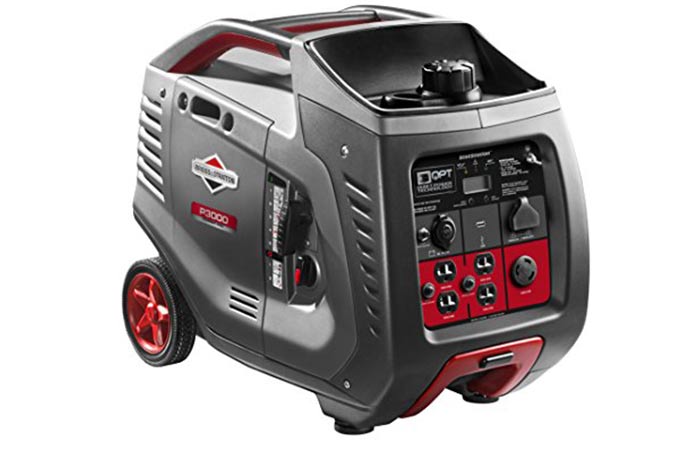
Why are Generators so Loud?
There are several reasons as to why generators produce noise in the first place, and why that noise differs from one generator to the next. Among the reasons why your generator is so loud include the following:
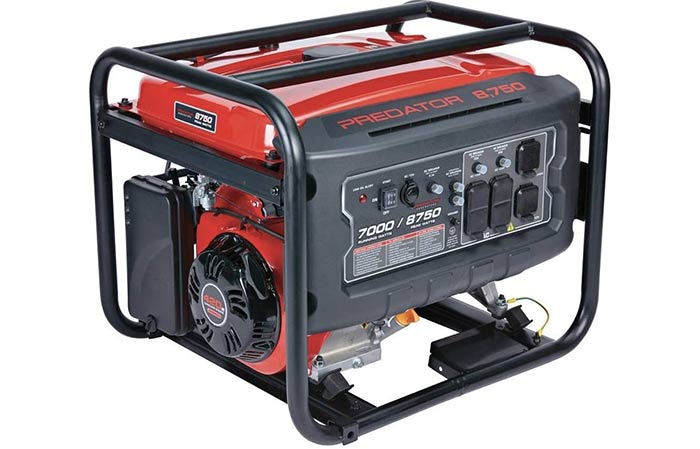
The combustion process
Combustion engines such as generators, cars, trucks and others all generate power by burning fuel in the combustion chamber. The pressurized mixture of air and fuel explodes to force the piston in one direction with the generated motion being harnessed to generate power.
That explosion in the combustion chamber is what causes the roar of the engine. While it can be contained within the engine, the smoke has to come out through the exhaust system. The noise will also escape through the exhaust pipe. You might have noted that the generator is noisier from the side of the exhaust pipe than from the other sides.
Compared to larger engines such as cars, generators tend to be louder relative to their size as they have less insulation around the combustion chamber. Generators have thin materials that are cooled by air while larger engines have thicker ones such as steel and are cooled mostly by liquids.
Amount of power generated
Generally, the more the power a generator produces, the noisier it should be. This is especially true for the medium to low end models. This is because more power means more combustion chamber explosions which lead to higher noise levels.
With more costly options, you can have a higher power output with little noise. This is because they’re made with higher quality and thicker materials which are better at muffling the noise from their engines. They also pack many noise-reduction features compared to their cheaper counterparts.
Generator location
Some locations for your generator can actually make it seem louder than it really is. For example, if you place the generator right next to your tent, house or other place of use it’ll obviously sound louder than if you’d placed it further away.
If you also place the generator on shaky or shallow ground, the noise will be amplified making it seem much louder. Placing it close to a wall is also not a good idea as the noise bounces off the wall making it much louder. Keep in mind that placing it close to the wall isn’t a wise choice as it can easily lead to carbon monoxide poisoning. The generator should be at least 15 feet from the area of use.
From this, you should place the generator in an open place away from obstacles to have the quietest user experience. The ground should also be stable enough to keep it in one place and contain its noise.
The sound level of your generator is measured in decibels (dB). With decibels, an increase of 10 decibels doubles the noise level. Most portable generators (the type for camping) will produce anything between 50 to 100 decibels of noise. At 50 decibels, two people can talk with a generator right next to them without an issue. At 100 decibels, the generator can be heard from several miles away in the woods.
Cooling fan noise
A generator is cooled either with air or a liquid such as water or a coolant. The most efficient method between the two is the liquid cooling. It’s quieter and more effective at cooling the engine.
A majority of the generators on the market are, however, air-cooled. This means that they’re fitted with a fan that circulates air within the engine thus blowing away the heat. This fan is usually quite noisy and it gets noisier as the engine gets warmer.
Alternator noise
In a combustion engine such as a generator, the alternator has the role of converting mechanical energy into electrical energy in the form of alternating current (AC). Basically, when the generator’s engine runs, the motions of the piston and crankshaft are converted into electrical energy by the alternator.
Its motions, being mechanical, are characterized by noise which contributes to the overall noise of the generator. The alternator doesn’t make much noise compared to the other parts, however.
Generator technology and age
Newer generators are likely to be less silent since they come with some of the best technologies in noise management such as mufflers and noise deflectors. Also, newer generators are less likely to have loose and worn out parts which contribute to the overall noise of an engine.
More and more of the new generators are of the inverter type. They’re thus smaller and make less noise even when they produce similar amounts of power as conventional generators. Most are called eco-mode generators as they use up less fuel while producing less noise and emissions than their conventional alternatives.
Malfunctioning muffler
The muffler is a piece of equipment meant to muffle the noise from the generator. It’s also fitted on other types of engines with the same purpose. If it’s broken, punctured or not fitted properly, the generator will be noisier than usual.
Induction noise
Induction noise is the sound generated as the air flows into the combust chamber before combustion. It’s the noise made by the opening air valve and the retracting piston to push air into the combustion chamber. It’s not much noise but a significant one given that it occurs throughout the period the generator will be on.
These aspects and activities combine leading to a noisy generator depending on how much the sound from it is managed.
More Generator How-tos & Hacks
- Generator Won’t Start (New & Used): Causes, Troubleshooting & Fixes
- Generator Pull Cord Won’t Retract: Causes & Fixes
- How to Start a Generator: New, Used, With/Out Pull Cord
- Generator Won’t Stay Running: Causes & Fixes
- Generator Running Rough & Not Smoothly-Causes + Fixes
- How to Connect /Hook Generator to House without Transfer Switch
- How to Change Oil in Generator-Step by Step
- How to Clean Generator Air Filter & Housing
- How to Fix an Overloaded Generator
- 15+ ways to Secure Portable Generators from Theft & Damage
- Portable Generators Safety Tips Checklist
- How to Make Generator Safe for Your Electronics
